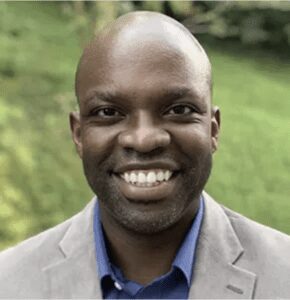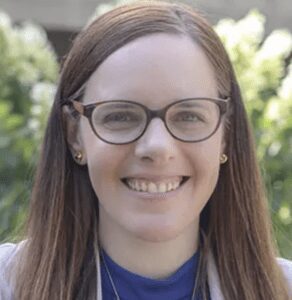 Two School of Journalism and Electronic Media faculty members are receiving awards for their recent research projects, both of which are driven by aspects of diversity, equity, and inclusion.
Two School of Journalism and Electronic Media faculty members are receiving awards for their recent research projects, both of which are driven by aspects of diversity, equity, and inclusion.
Assistant Professor Guy Harrison’s work studying the impact of COVID-19 on black women working in television broadcast news earned him the Broadcast Education Association’s Diversity and Inclusion Research Award.
Assistant Professor Joy Jenkins’ case study on the Milwaukee Neighborhood News Service garnered her the 2022 Gene Burd Award for Research in Urban Journalism Studies from the Association of Educators in Journalism & Mass Communication.
“The awards that Joy and Guy individually received underscore the impactful research that both are engaged in,” said Dr. Catherine Luther, director of the School of Journalism and Electronic Media. “Their research endeavors not only contribute to furthering our scholarly knowledge about important subject matters related to diversity, equity, and inclusion, but also hold much promise in playing roles in facilitating needed changes at the societal and political levels.”
Guy Harrison’s Research
 Harrison worked with JEM graduate student Charli Kerns and another graduate student from the University of South Carolina to interview 11 black women across the United States about their experiences at work during the height of the COVID-19 pandemic, as well as other impactful events such as the resurgence of the Black Lives Matter movement.
Harrison worked with JEM graduate student Charli Kerns and another graduate student from the University of South Carolina to interview 11 black women across the United States about their experiences at work during the height of the COVID-19 pandemic, as well as other impactful events such as the resurgence of the Black Lives Matter movement.
“When we think about essential workers, of course we think about grocery store workers and teachers, but there are also people on the frontlines in journalism,” Harrison said. “Both COVID-19 and police violence against black citizens were ravaging black communities, so we wanted to know how these women were navigating that.”
What they learned is many of the women were more outspoken than before, often speaking up about issues at work when previously they may have stayed silent. For example, there’s been a debate in recent years about certain black hair styles being considered unprofessional, with California even instituting the anti-hair discrimination Crown Act in 2019. Harrison’s research found many of these black women broadcasters were once reluctant to wear certain hairstyles or to even ask management if it would be allowed. Now, he said, they’re either asking to where those styles or they’re just wearing the style of hair they prefer without asking. While the women feel more empowered to take a stand, this also comes with a price, Harrison said.
“We as co-authors argued that it’s not really fair to expect these women to take the lead on all these things, to be responsible for overcoming their own marginalization. Because they’ve had to take matters into their own hands, many of them report being exhausted,” Harrison said.
Harrison and his co-authors presented the paper at BEA’s recent conference in Las Vegas and plan on publishing their work soon.
Joy Jenkins’ Research
 Jenkins teamed up with Assistant Professor Ayleen Cabas-Mijares of Marquette University to study a local news outlet in Milwaukee that covers and delivers news in a different way than the traditional mainstream outlets in the area have historically done. The two researchers took an in-depth look at the Milwaukee Neighborhood News Service, an online publication focused on under-covered minoritized neighborhoods in Milwaukee, to better understand how local news coverage may be evolving to better serve their communities.
Jenkins teamed up with Assistant Professor Ayleen Cabas-Mijares of Marquette University to study a local news outlet in Milwaukee that covers and delivers news in a different way than the traditional mainstream outlets in the area have historically done. The two researchers took an in-depth look at the Milwaukee Neighborhood News Service, an online publication focused on under-covered minoritized neighborhoods in Milwaukee, to better understand how local news coverage may be evolving to better serve their communities.
“This newsroom is really diverse, and a lot of the journalists are local and come from the neighborhoods they’re covering,” Jenkins said. “Basically, when you talk to the journalists, they say, ‘We know we’re covering neighborhoods that are under-covered and stereotyped and are typically only covered [by mainstream news] when there’s a crime, and we want to be there for them.’”
It’s a departure from the idea of supposedly unbiased journalism and reflects shifting approaches to how media can be used to further social justice and support local communities, especially those with historically marginalized populations.
“They’re open and transparent and willing to be flexible about beats and coverage, and they are in constant conversation with communities. They’re super transparent about what their goals are and what the problems are, and they’re not trying to perpetuate those problems through their work,” Jenkins said.
While Jenkins and Cabas-Mijares are currently in the data collection stage of their research, if their proposal is accepted for the AEJMC conference in August, they will produce a full paper that will be presented at that conference. This award also comes with a monetary award, which will allow Jenkins to travel to Milwaukee this summer and continue her research.
